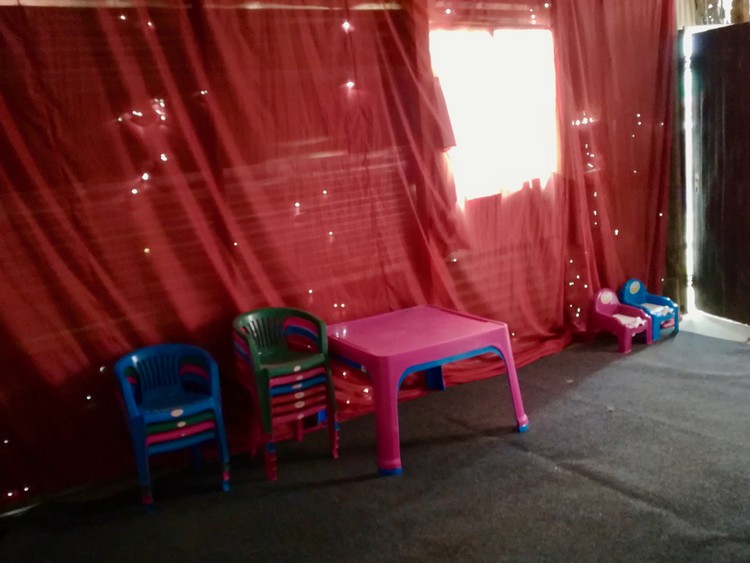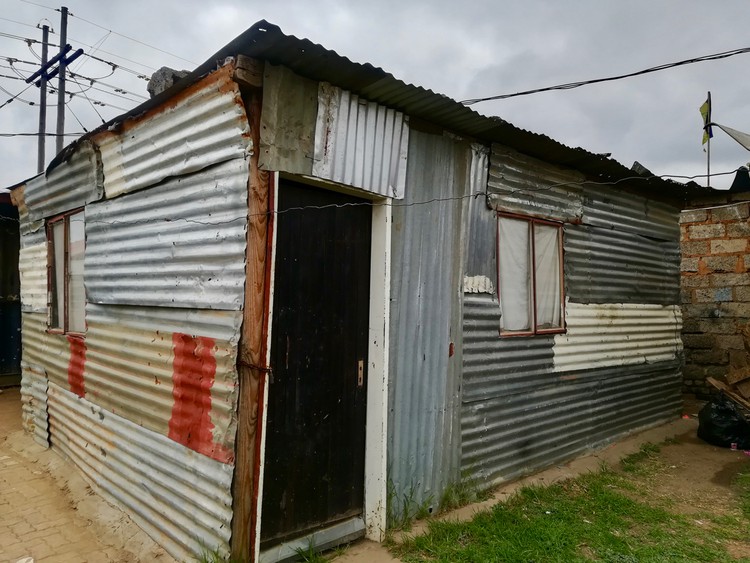Midrand crèche has community support but needs cash
An informal early childhood development centre has closed due to a lack of funds
A crèche opened in October 2018 in Mzondi informal settlement, East of Johannesburg, has been closed since the beginning of this year due to a lack of funds. The crèche needs supplies and repairs to its corrugated iron structure which is riddled with holes.
Established by Cynthia Radebe, the structure was made from second-hand materials because that was all she could afford. Bad weather did further damage and the structure is no longer suitable for children.
But Radebe is determined to get her crèche back up and running. “I’ve decided to get a temporary job for a few months and use that money to fix the structure, so the crèche can reopen,” she said.
She said people from the community have asked her to reopen the crèche because it is costly for them to take their children to the nearest crèche in Ivory Park every day.
Radebe asked community leaders for a plot to build the crèche and she took out a loan to buy ten chairs and two tables. She charged parents about R300 per month.
Nyoni Mazibuko, a community leader, said they immediately supported the idea when Radebe approached them.
“Now that the crèche is closed, some children go to a crèche in Ivory Park, but others are just playing around the dumps all day … They need to be learning, so they can make a better future for themselves,” he said.
“Most of the people who live in Mzondi are unemployed so they need time to go out and look for jobs. That becomes difficult when you have to take care of children. So I wanted to provide them with a space where they can leave their children and know they are safe,” said Radebe.
The crèche is conveniently located 500 metres from a taxi rank.
A typical day at the crèche involved reading stories, poems, learning nursery rhymes and drawing. “Although there isn’t a formal curriculum, I’m trying to introduce the kids to learning,” said Radebe.
Getting funds from government
“I’m in the process of registering the crèche at the department [of Social Development] so once that is done, I will be able to apply for funding and employ someone to teach the older kids. I also want to feed the children,” said Radebe.
GroundUp tried repeatedly to get comment over 10 days from the Department of Social Development Gauteng, but to no avail.
A social worker who works with ECD centres, Lebo Moropane, told GroundUp that there is funding available for ECD centres but Radebe needs to get certificates from City Planning and the Department of Health before the Department of Social Development can consider funding her crèche.
“The inspectors [from City Planning and Health Department] will come and look at the spatial planning of the centre, how the food is being prepared, the nutritional value, food storage etcetera, and then they will issue certificates based on compliance,” said Moropane.
He said social workers would also facilitate the running of the ECD centre to make sure that the operations are in the best interest of the children.
“So if the ECD centre doesn’t have a proper curriculum, we [social workers] refer them to the Department of Education for training, if their menus do not meet nutritional requirements, we refer them to the Department of Health,” said Moropane.
 Mzondi crèche needs supplies. Photo: Zoë Postman
Mzondi crèche needs supplies. Photo: Zoë Postman
Early Childhood Development a priority
In his State of the Nation Address in February, President Cyril Ramaphosa said, “This year, we will migrate responsibility for ECD centres from Social Development to Basic Education, and proceed with the process towards two years of compulsory ECD for all children before they enter grade 1”.
According to StatsSA, only about 43% of South African children under five are exposed to an Early Childhood Development (ECD) programme outside their homes.
A breakdown by monthly household incomes shows that close to half of the children in lower income households do not attend any educational centre.
Professor Eric Atmore, a researcher who runs the non-profit organisation Centre for Early Childhood Development, said crèches, also known as ECD centres, are critical in meeting the early growth and development needs of young children.
He said most informal centres like Radebe’s do not have the funds to manage the centres optimally or to pay teachers a reasonable salary.
Teachers might be passionate and dedicated to their work, Atmore said, but the programmes were often of poor quality compared to more privileged ECD centres.
“Children in privileged ECD centres get quality early learning with an age-appropriate curriculum. These are the children who enter Grade 1 confident and competent and these are the children who make it through to Grade 12 and into tertiary education,” said Atmore.
According to the Gauteng Social Development department’s annual performance plan for 2018/2019, about 37% of young children in Gauteng do not attend any ECD facility.
The plan cited ECD programmes and centres as one of its four priorities for 2018-9, promising increased financial support, renovation of ECD facilities and “construction of new ECD facilities in the poorest wards”.
The department also plans to fund minor renovations of qualifying ECD centres so that these sites reach a minimal level of compliance. It has received a grant of about R62 million to implement this, which will increase over the next three years.
According to the Gauteng department 2017/2018 annual report, 100,518 children were reached through 1,437 funded ECD centres.
The total national grant for ECDs works out to R15 per child for 264 days of the year.
Atmore believes national government, provincial government, and local municipalities are doing “very little” to assist ECD centres.
Next: Residents burn down Alra Park police station
Previous: Asylum seeker battles because of Home Affairs’ spelling mistake
© 2019 GroundUp.
This article is licensed under a Creative Commons Attribution-NoDerivatives 4.0 International License.
You may republish this article, so long as you credit the authors and GroundUp, and do not change the text. Please include a link back to the original article.



